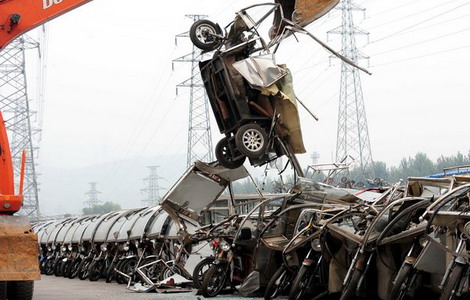Kan's woeful legacy
Updated: 2011-08-27 07:55
(China Daily)
|
|||||||||||
Japan's Prime Minister Naoto Kan offered his resignation on Friday, paving the way for a third Democratic Party of Japan (DPJ) leader to lead the country in less than two years and overall the seventh in five years. Kan's successor is likely to be chosen on Aug 29.
Kan had been under constant fire for his slow response to the nuclear radiation crisis, which was triggered by the deadly earthquake-caused tsunami on March 11. Apart from the triple disaster, Japan has also been facing other problems, such as a colossal public debt and disputes with neighboring countries over maritime borders since Kan took office in June 2010.
But his resignation will not solve Japan's problems. Instead, his successor will keep battling with them both on the internal and external fronts. Post-disaster reconstruction, rehabilitation of people, and cleaning up of radiation-affected areas will be the biggest challenge for Kan's successor.
Even more than five months after the world's worst nuclear disaster in 25 years, Japan has not come up with a clear road map to deal with it. The cleanup could cost tens of billions of dollars and take years to complete. The capability to provide strong leadership in overcoming the nuclear disaster will be the first political test for Kan's successor and will decide whether his term in office will be long or short.
The new incumbent's prospects on the diplomatic front are not rosy either. Prompted by rightist sentiments, Kan's government assumed a tough stance over maritime territory disputes with neighboring countries, including China. The dispute over Diaoyu Islands soured relations between the two countries last year and continues to haunt bilateral ties. And the fact that Japan's Defense White Paper, released earlier this month, views China as a threat has worsened matters.
The incoming prime minister and his Cabinet will need the political wisdom to emerge from the hawkish shadows of the previous disposition while handling relations with Japan's neighbors.
Kan's resignation less than 15 months after assuming office paints a gloomy picture of Japan's political scenario. Many observers say Japanese politicians are playing musical chairs with the prime minister's post. None of the prime ministers has been able to deliver on his promises in the past five years. Rather than charting the future of the country and contributing to global development, Japan's leaders have used their time and energy to cling on to power as long as possible.
No wonder, Japanese people doubt the credibility of their government. And it would not be surprising to see some observers cite political developments in Japan to question the political fundamentalism practiced by the West. After all, democracy should not be synonymous with inefficiency, weak leadership and political vendetta.
Hot Topics
Anti-Gay, Giant Panda, Subway, High Speed Train, Coal Mine, High Temperature, Rainstorm, Sino-US, Oil Spill, Zhu Min
Editor's Picks

|

|

|

|

|

|







